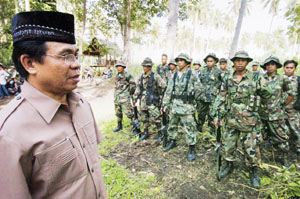Watershed in the Mindanao islands
 Prospect: A promise of "self-determination" for the Muslim minority
of the Southern Mindanao islands of the Philippines, by the
archipelago's centre, has raised the prospect of the long-running,
bloody Southern insurgency in the South East Asian state coming to an
end. Prospect: A promise of "self-determination" for the Muslim minority
of the Southern Mindanao islands of the Philippines, by the
archipelago's centre, has raised the prospect of the long-running,
bloody Southern insurgency in the South East Asian state coming to an
end.
"We appreciate this development. We feel it is an advancement in the
search for peace in the Mindanao", Al Haj Murad, head of the Moro
Islamic Liberation Front, the chief rebel group in the Southern islands,
was quoted saying.
The most absorbing issue to flow from this development is the
specific form "self-determination" would take in practice, if this right
is granted. As commonly understood, political self-determination which
is synonymous with a people's sovereignty, should issue in the
establishment of a separate state for the Muslims in the Mindanao
islands.
|

PHILIPPINES: Murad Ebrahim, chairman of the Muslim separatists Moro
Islamic Liberation Front (MILF) inspecting his troops at the rebels’
base in Camp Darapanan in Maguindanao province in southern
Philippine island of Mindanao. Murad on 15 March 2007 accused
“hawkish” Philippine officials of trying to sabotage peace talks
between the government and MILF. AFP
|
It need hardly be said that separate statehood is a politically
explosive issue which most states would handle very discreetly. After
all, the current tendency on the part of the world community is to frown
upon separatist demands. Accordingly, it would be interesting to find
out what specific political arrangement Manila envisaged when it spoke
of "self-determination" for the Mindanao islands.
In passing it may be observed, however, that regional autonomy and
confederacies come under the rubric of self-determination for peoples.
Only time would tell how these political dilemmas would be resolved by
the parties to the Mindanao rebellion.
Meanwhile, it is interesting to note that the dynamics of the
Mindanao conflict have been following a familiar pattern over the
decades. Mindanao brings the realisation that identical power relations
among communities anywhere could have the same political consequences.
From the time of political independence in 1946, some central
governments in the Philippines have seen the need to dilute the ethnic
composition of the Southern islands. Accordingly, populations whose
religious identity is Catholic have been increasingly settled among the
Muslims in the Southern islands, who have been natives of the region for
centuries.
What has been coveted by successive central administrations are the
valuable natural resources of the islands. The aim in settling Catholics
in the islands in increasing numbers by the centre has been the blurring
of the identity of the region as a Muslim majority territory.
Increasing population pressure on land and other resources has,
naturally, put the communities on a collision course and helped in
triggering the armed separatist rebellion by the Moros, as the Muslims
of the region have come to be known.
Since the Catholics constitute the majority community in the
Philippines we see in the Mindanao conflict, an effort by a majority
community which controls the State and its resources, to exercise
hegemonic control over a minority ethnic group, thus setting the stage
for a full blown separatist rebellion by the latter.
These salient points came strongly into focus in 1972 when the then
Philippines President Ferdinand Marcos decided to clamp emergency rule
on the archipelago. This left the Moro rebels with no choice but to
intensify their armed rebellion because increased repression by the
centre had the effect of stepping-up armed opposition to central rule.
Thus would have been set in motion the vicious circle of repression
followed by armed opposition, which in turn would have heightened
central repression, leaving the Moros with no choice but to demand a
separate polity.
Given this backdrop, the promise of "self determination" could be
considered a watershed development in the long-running rebellion.
Another instructive lesson in handling a separatist revolt could be said
to be unfolding. |

